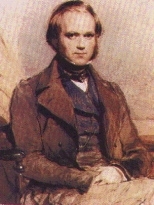The campus events this week celebrating the 200th birthday of Charles Darwin are much more than a matter of cake and ice cream to researchers like Jonathan King. The MIT professor of molecular biology sees the occasion as a chance to examine Darwin's theories on natural selection across an array of disciplines, with an eye toward better understanding how the Earth of tomorrow is being shaped by the organisms of today.
"We have reached a point in human history where it has become dangerous for societies to fail to recognize the connection between the chemical and biochemical impacts of life at the Earth's surface, on Earth's oceans, atmosphere and climate," says King, who is organizing the three-day Darwin Bicentennial Symposium.Â
Featuring some of the nation's most prominent researchers in a variety of disciplines, the Jan. 22-24 conference will highlight recent discoveries on how evolution works and how it continues to alter our lives. Ranging from sessions on evolution of the Earth, air and sea to the famed British naturalist's impact on culture and society, the symposium will honor a scientist whose name in recent years has been a touchstone of controversy. The conference underscores how evolutionary processes affect everything from our eyesight and immune system and to the air we breathe and the water we drink.Â
Thursday's session in the Broad Auditorium will begin with lectures on the early origins of the earth, its oceans and atmosphere and photosynthesis by Earth, Atmospheric and Planetary Sciences (EAPS) researchers; the session continues with a look at how "Life Alters the Earth," by Dianne Newman, biology professor, and an overview of the "History and Future of the Earth's Climate," by EAPS professor of meteorology Kerry Emanuel.
Friday's session, also in the Broad, looks at vertebrates with lectures on recent dramatic advances in evolutionary biology, including recent discoveries about the evolution of fins to limbs by Farish Jenkins Jr., Harvard University biology professor.Â
On Saturday, speakers at the MIT Museum will examine the impact of Darwin's theories on society, culture, and science education and Darwin's contributions to the biological basis of human equality. MIT Museum Director John Durant, adjunct professor in the Program in Science, Technology and Society, will speak on current controversies over the teaching of evolution. King will review Darwin's background as an abolitionist who insisted that all humans were members of one species.
The conference is the first in a series of events sponsored by the Massachusetts Darwin Bicentennial Project aimed at forging stronger links between high school science teachers and research scientists in colleges and universities.
A complete list of presenters and a schedule is posted at www.darwinbicentennial.org. The conference is free and open to the public, but seating is limited and therefore online pre-registration is required.






